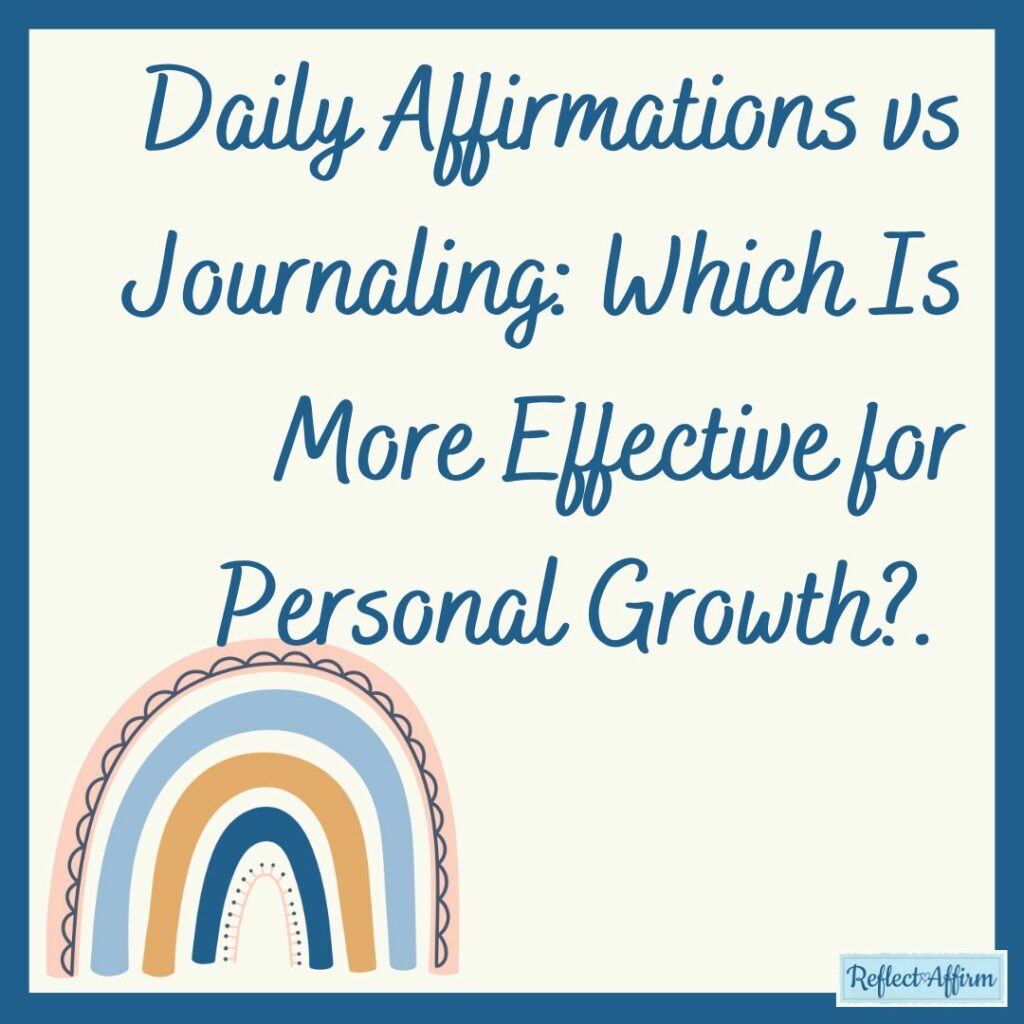
You’re at a crossroads in your personal growth journey. On one path, you see the shiny promise of daily affirmations. On the other, there is journaling. Which one do you practice? The answer may surprise you.
Granted, both will boost your confidence, clarity, and well-being, but they work differently. You have to find the right combination that works for you. In this article, I’ll tell you all you need to know about daily affirmations and journaling and which is best for you.
The Power of Words: Daily Affirmations
Ever catch yourself muttering negative thoughts under your breath? It’s time to change that. Daily affirmations are like a pep talk from your best self, reminding you of your worth and potential.

How Daily Affirmations Work
Think of affirmations as seeds you plant in your mind. You water them with repetition; before you know it, they bloom into reality. It’s not magic; it’s the power of positive thinking in action.
When you start your day with “I am capable of achieving great things,” you’re setting the tone for success. Your brain starts looking for ways to make that statement true.
Benefits of Daily Affirmations
Your brain is constantly rewiring itself. When you repeat affirmations, you’re creating new neural pathways. It’s like carving a path through a dense forest. The more you walk it, the clearer it becomes.
Studies show that positive self-talk can reduce stress and improve performance. It’s not just feel-good fluff; it’s backed by research. Your words have the power to shape your reality.
Creating Effective Affirmations
Not all affirmations are created equal. The key is to make them personal, positive, and present tense. Instead of “I want to be confident,” try “I am confident and capable.”
Be specific with your affirmations. For example, if you’re aiming for a promotion, your affirmation may be, “I am a valuable asset to my team, and my skills are recognized and rewarded.”
Remember, affirmations aren’t about denying reality. They focus on the positive and create a vision for your future. It’s not lying to yourself; it’s choosing to believe in your potential.
The Power of Reflection: Journaling
While affirmations are about speaking your truth, journaling is about discovering it. It’s a chance to have an honest conversation with yourself; no filters needed.
How Journaling Works
There’s something special about writing by hand. It slows down your thoughts, forcing you to really process what’s going on in your head.
Journaling isn’t about perfect prose or grammar. It’s about getting your thoughts out of your head and onto paper. Think of it as a brain dump. It’s messy, raw, and real. Also, it isn’t about recording events but understanding them.
Benefits of Regular Journaling
Journaling helps you connect the dots between your thoughts, feelings, and actions. This self-awareness is the foundation of personal growth.
Writing about stressful events can help you process them more effectively. It’s like talking to a therapist, but the therapist is you. You may be surprised by the insights you uncover when exploring your mind.

Making Journaling a Habit
Like any habit, consistency is key. Set aside a specific time each day for journaling, even if it’s just for five minutes. Some people prefer to journal in the morning to set intentions for the day, while others use it to wind down before bed.
Keep your journal and pen visible as a reminder. If your tools are readily available, you’re more likely to write. And don’t worry about writing every day. Aim for consistency, not perfection.
The Affirmations vs Journaling Comparison
So, which method is best when it comes to personal growth? The truth is that both have their strengths. Let’s break it down:
Affirmations Pros and Cons
Pros:
- Fast and easy to implement
- Can be done anywhere, anytime
- Immediately shifts your mindset
- Great for boosting confidence in the moment
Cons:
- Can feel forced or inauthentic at first
- May not address deeper issues
- Requires consistent repetition to see results
Journaling Pros and Cons
Pros:
- Provides deeper insights into your thoughts and behaviors
- Helps process complex emotions
- Creates a record of your personal growth journey
- Can be therapeutic and stress-relieving
Cons:
- Takes more time and effort
- Requires privacy and a quiet space
- May bring up difficult emotions
The Verdict: Daily Affirmations vs Journaling
So, what’s the verdict? Daily affirmations vs. journaling: which is more effective for personal growth? Here’s the plot twist: you don’t have to pick just one.
Affirmations and journaling are like peanut butter and jelly. They’re both great on their own but even better together. By combining these methods, you’re doing personal growth from all angles.
Start your day with affirmations to set a positive tone. Then, journal to go deeper into your thoughts and feelings. The affirmations boost your confidence, while journaling helps you understand why you needed that boost in the first place.
So why choose? Practice both methods and they’ll propel you toward the life you’ve always dreamed of. Your future self will thank you for it.

Practical Tips for a Personal Growth Plan
Now that we’ve covered the what and why, let’s talk about the how. How do you actually incorporate these practices into your life? Here’s a simple plan to get you started
1. Start Small
Don’t try to launch into an hour-long journaling session every day if you’ve never journaled before. Start with just five minutes daily and gradually increase as it becomes a habit. The same goes for affirmations – start with just one or two that really resonate with you.
2. Be Consistent
It’s better to do a little bit every day than a marathon session once a week. Think of it like watering a plant – regular, consistent care will yield the best results.
3. Set a Schedule
Find a time and place that works for you. Maybe you like to journal first thing in the morning with your coffee. Or you prefer to do your affirmations while you’re in the shower. There’s no right or wrong time. The best time is the one that you’ll actually stick to.
4. Don’t Be Afraid to Experiment.
Try different types of journaling until you find what works for you. You can do free writing, gratitude journaling, and bullet journaling. With affirmations, play around with saying them out loud, writing them down, or even recording them and playing them back to yourself.
5. Give it Time
Remember, it’s okay if it feels awkward or forced at first. Like any new habit, it takes time to feel natural. Stick with it, and before you know it, it’ll be as much a part of your routine.
Your Personal Growth Toolkit
Whether you choose affirmations, journaling, or combining both, it’s an important step toward self-improvement. These practices are like two sides of the same coin. So why settle for one when you can have the best of both worlds? Grab that journal, speak those affirmations, and watch as you transform into the best version of yourself.




